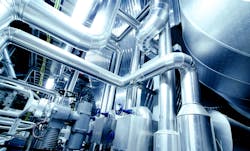Improper filtration or lack of filtration can wreak havoc on components, reducing their life and changing the final product. If left unaddressed, this can lead to equipment failure, process upsets, increased quality issues and in some cases, unplanned shutdown. Therefore, making an investment in the correct filter for process flow operations is a wise choice.
There are many decision-making elements that come into play. Above all, when deciding on process filtration and OEM replacement filters (or aftermarket filter solutions), cost should not be the only deciding factor.
Filters are insurance
Filters are designed to protect equipment and improve a process fluid by removing solids, semisolids, vapors, aerosols and liquids or by chemically conditioning the process stream to a desired standard. Deciding which filters to use can be a complicated ordeal. There are a few facts that need to be understood to begin the decision-making process.
- Fit: They need to fit the housing and the application they are going into.
- Form: They must be compatible with the flow, pressure and chemical makeup of the process and function in the process housing without bypass.
- Function: They need to perform to customer expectations for particulate removal or chemically condition the process fluid along with the life of the filter (frequency of change-out).
Life or time to change-out should be defined by a change indication event: time, reduced flow caused by the filter becoming a restriction thus increasing differential pressure, all values being measured or a combination of measured values.
So, how does one determine if a given filter works in an operation? It stands to reason that if the filter fits the application and filter housing and performs to an acceptable standard in the process, it is a good filter. Then, it simply becomes a matter of price and availability, right? While this may be true for a homeowner deciding on water or furnace filters, it should not be the deciding factors for complex processes or critical equipment — and certainly not for a corporation with diverse equipment and multiple locations.
As operations budgets are always looming, ensuring a high return on investment is critical. There is more to making sound financial decisions than simply pricing out available filters. Several factors must be considered to determine the true costs and return on investment (ROI):
- Improved life of process equipment
- Reduction in unplanned outages and downtime
- Total life of a filter
By understanding these elements, one can successfully build a comprehensive process to reduce filter replacement, which will have an enormous effect on the overall costs.
A comprehensive approach
It is highly recommended to implement a corporate filtration strategy that includes a total cost of filtration evaluation. These initiatives will save the corporation resources in the long run and provide additional benefits in daily operations.
A corporate filtration strategy establishes filtration standards for the process and protection of equipment. Without a standard, there can be no meaningful metrics. A strategy considers equipment and process requirements at all locations, seeking interoperability, thus reducing corporate filtration spend and increasing buying power. The added benefit is the ability to share resources between locations in an upset situation. A good corporate filtration strategy includes buy-in from several different departments within an operation, keeping everybody pulling in the same, focused direction. A good filtration strategy team includes engineering, operational, planning, maintenance, safety, compliance and supply chain personnel. It is important that site strategies sync up whenever possible across all locations with similar equipment and/or processes as a pivotal component of the corporate strategy.
Total cost of filtration is a concept that considers the initial cost of the filters, change frequency, labor, impact on process interruption, impact of filter failure on process, inbound freight, warehouse concerns (including filter shelf life), safety, availability, versatility across a given installation or on a corporate scale, interoperability with other locations, disposal costs, regulatory compliance, ease of use and more. In fact, the initial cost of the filter should be a minor consideration when selecting the correct one for an application.
Measurement
As with any process, if you cannot measure it — you cannot manage it. Pressure measuring devices are critical sensors in any filtration strategy. Transducers, pressure gauges, differential pressure gauges and manometers provide change indication event information. Automation of the remote sensors improves control in complex facilities and can be instrumental in preventing cascading failures that may result in a catastrophic event.
Another helpful concept is the filter survey — a tool used to collect the locational and operational filtration data needed to determine total cost of filtration. Combined with data points from purchase history, operational readiness rates, post upset evaluations, turnover requirements and other contributing data points, the filter survey underpins the evaluation and decision-making process to develop and implement a well-rounded corporate filtration strategy. An annual review of performance versus strategy expectations ensures positive evolution and constant improvement.
Using information gathered from the survey and working with engineering, maintenance and storeroom teams, a qualified expert can help understand problem areas, introduce new technologies where applicable to ensure optimization of processes, reduce change-out intervals and help reduce unplanned outages. It makes sense to partner with an expert with the engineering knowledge, process knowledge, product knowledge, diverse experience and committed personnel to assist in creating a strategy-based filtration solution with measurable results. Change is not a process for the impatient, but as Stephen Hawking said, “Intelligence is the ability to adapt to change.”
Tim Tritch is the vice president of business development for Valin Corporation, a leading technical solutions provider for the technology, energy, life sciences, natural resources and transportation industries. Valin offers personalized order management, on-site field support, comprehensive training and applied expert engineering services utilizing automation, fluid management, precision measurement, process heating and filtration products. For more information, visit valin.com.
